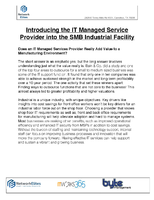Signal Conditioner IC is suited for automotive environments.
Share:
Press Release Summary:

With on-chip diagnostics for use with all types of wheatstone bridge sensors, Model ZMD31150 features error-correcting function for uncorrupted EEPROM content and increased MTBF. Analog pre-amp gain of 420 accommodates bridge outputs of 1 mV/V, while 16-bit ADC with integrating input characteristic gives 7.8 kHz sample rate. Product comes with built-in programmable digital filter, and delivers ±0.1% FSO from -25 to +85°C, ±0.25% FSO from -40 to +125°C, and ±0.5% FSO from -40 to +150°C.
Original Press Release:
ZMD Advances On-Chip Diagnostic Technology for Automotive Sensors
DRESDEN, GERMANY, NOVEMBER 15, 2006 - ZMD AG, a global supplier of low-power mixed-signal solutions for automotive and medical applications, today introduced the ZMD31150 high-speed automotive signal conditioner IC with advanced on-chip diagnostics for use with all types of wheatstone bridge sensors.
The ZMD31150 is designed for all sensing applications in automotive environments, such as fuel injection, ABS, power steering, air induction, fuel tank, air conditioning and occupant classification.
"In some applications, speed is of the essence," stated Frank Schulze, Business Line Manager Automotive at ZMD. "For optimum safety in a car crash, the car must sense the size, weight, and orientation of the front-seat occupants - quickly, in order to control the airbag's deployment. The ZMD31150 is two to seven times faster than other signal-conditioning chips with comparable accuracy, and its diagnostic features mean increased reliability when it's needed most."
Sensor inaccuracy or failure is a leading cause of unscheduled service for modern automobiles. A sensor signal conditioner (SSC) must either give a known-correct response, or report an error code. Enhanced real-time diagnostics in the ZMD31150 detect faulty connections, shorts and power loss events.
An error-correcting function in the EEPROM insures uncorrupted EEPROM content and increased MTBF. This is backed up with an EEPROM signature check which detects severe, uncorrectable multibit failures. To enhance hardware reliability, the output is protected against short-circuits, reverse-polarity, and voltages as high as 33 Volts.
The ZMD31150 provides highly accurate amplification and sensor-specific digital correction of bridge sensor signals. An analog pre-amp gain of 420 accommodates bridge outputs as low as 1mV/V and an extended sensor offset. A fast 16-bit ADC with an integrating input characteristic gives a 7.8 KHz sample rate, so the whole system delivers a comparable analog bandwidth of 4 KHz. Accuracy and flexibility is further enhanced by selectable internal or external temperature sensors. This allows more precise temperature compensation of sensor readings.
Signal conditioning is done by an internal digital signal processor running a correction algorithm based on calibration coefficients stored in the on-chip EEPROM. By calibrating the chip to a specific sensor digitally, users gain the benefits of speed and accuracy, while eliminating the cost associated with trimming methods using lasers and/or external devices.
Calibration is accomplished easily with a simple PC-based program using the ZMD31150's serial interface. Additional EEPROM bytes allow storage of a serial number or other product-traceability data. Because it is re-programmable, sensors can be recalibrated as often as desired. This makes field replacement of sensors easier, more accurate and less expensive.
The measured and corrected bridge values are provided at the output pin, which can be configured as an analog voltage output with 12-bit resolution, or ZMD's ZACwire(TM) one-wire digital output, or as an I2C(TM) bus signal. A built-in programmable digital filter helps fit the sensor system response to the required output behavior. The output levels also have programmable digital clipping levels. All together, this delivers excellent accuracy: ±0.1 percent FSO from -25 to +85°C, ±0.25 percent FSO from -40 to +125°C, and ±0.5 percent FSO from -40 to +150°C.
Accurate fuel-system pressure monitoring is essential for the new Gasoline Direct Injection (GDI) and diesel common-rail injection engines. The ZMD31150's wide temperature range (-40 to +150°C), high accuracy, and sophisticated diagnostics fit well in this application.
A development kit supports the ZMD31150 evaluation and experimental calibration. The kit includes PCBs, samples, software and technical documentation.
Package, Price, and Availability
The ZMD31150 is available now in an SSOP14 package at a unit cost of US $ 3.32 for 1.5K units, or as a die at a unit cost of US $ 2.12 for 1.7K units. Support for industrial mass calibration is available, as is quick circuit customization for large production volumes.
About ZMD
Founded in 1961, ZMD AG is a leading supplier of analog mixed-signal integrated circuits for automotive, medical, industrial and consumer applications. ZMD specializes in the expert design, production, and marketing of low power application-specific integrated circuits (ASICs) and application-specific standard products (ASSPs). Its advanced circuit-design and fabrication expertise allow it to offer ICs with operating temperatures as high as +160°C, and voltages from 0.85 V to 40 V.
Headquartered in Dresden, Germany, ZMD has 550 employees worldwide and serves customers from the company's offices in Melville, NY; Santa Clara, CA; Stuttgart, Germany; London, England; Paris, France; Tokyo, Japan and Hsinchu City, Taiwan. ZMD has design centers in Dresden, Stuttgart, and Madison, Wisconsin. Learn more at www.zmd.biz.
ZMD America
201 Old Country Road, #204
Melville, NY 11747
T: 1-631-549-2666
www.zmd.biz
Gabriele Taschler,
ZMD America
T: 1-631-549-2666
taschler@zmda.com




